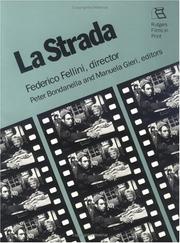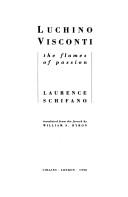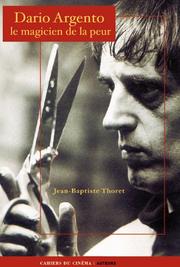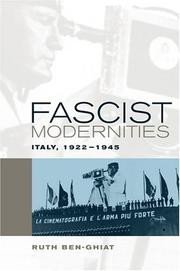| Listing 1 - 10 of 12 | << page >> |
Sort by
|

ISBN: 0813512360 9780813512365 0813512379 9780813512372 Year: 1987 Publisher: New Brunswick Rutgers University Press
Abstract | Keywords | Export | Availability | Bookmark
 Loading...
Loading...Choose an application
- Reference Manager
- EndNote
- RefWorks (Direct export to RefWorks)
Book
ISBN: 0862873568 9780862873561 Year: 1987 Publisher: London Columbus
Abstract | Keywords | Export | Availability | Bookmark
 Loading...
Loading...Choose an application
- Reference Manager
- EndNote
- RefWorks (Direct export to RefWorks)
Italian cinema films --- Directing --- Fellini, Federico - Critical studies
Book
ISBN: 9782729116453 2729116451 Year: 2006 Publisher: Paris Editions de la Différence
Abstract | Keywords | Export | Availability | Bookmark
 Loading...
Loading...Choose an application
- Reference Manager
- EndNote
- RefWorks (Direct export to RefWorks)
Visconti, Luchino, --- Visconti, Luchino --- Criticism and interpretation. --- Italian cinema --- Director
Book
ISBN: 9048554209 9463720367 Year: 2024 Publisher: Amsterdam, Netherlands : Amsterdam University Press B.V.,
Abstract | Keywords | Export | Availability | Bookmark
 Loading...
Loading...Choose an application
- Reference Manager
- EndNote
- RefWorks (Direct export to RefWorks)
No detailed description available for "Film Festivals, Ideology and Italian Art Cinema".

ISBN: 0002154781 9780002154789 Year: 1990 Publisher: London Collins
Abstract | Keywords | Export | Availability | Bookmark
 Loading...
Loading...Choose an application
- Reference Manager
- EndNote
- RefWorks (Direct export to RefWorks)
Motion picture producers and directors --- Biography --- Visconti, Luchino, --- Italian cinema films --- Directing --- Visconti, Luchino, 1906-1976

ISBN: 2866423453 Year: 2002 Publisher: Paris : Cahiers du cinéma,
Abstract | Keywords | Export | Availability | Bookmark
 Loading...
Loading...Choose an application
- Reference Manager
- EndNote
- RefWorks (Direct export to RefWorks)
Motion pictures --- Fantasy films --- Cinéma --- Films fantastiques --- Argento, Dario --- Cinéma --- Fantastic italian cinema --- Criticism --- Argento, Dario.
Book
ISBN: 2226004939 9782226004932 Year: 1977 Publisher: Paris : Albin Michel,
Abstract | Keywords | Export | Availability | Bookmark
 Loading...
Loading...Choose an application
- Reference Manager
- EndNote
- RefWorks (Direct export to RefWorks)
Fellini, Federico, --- Cinematography and photography. --- Fellini, Federico. --- Italian cinema films --- Directing --- Fellini, Federico --- Productions --- Motion picture plays --- Motion pictures --- Motion picture producers and directors --- History and criticism. --- Critique et interprétation. --- Fellini, Federico, - 1920-1993
Book
ISBN: 9789463720366 9463720367 9789048554201 Year: 2024 Publisher: Amsterdam Amsterdam University Press
Abstract | Keywords | Export | Availability | Bookmark
 Loading...
Loading...Choose an application
- Reference Manager
- EndNote
- RefWorks (Direct export to RefWorks)
Film Festivals, Ideology and Italian Art Cinema is the first systematic study of the role ideology plays in film festivals' construction of dominant ideas about art cinema. Film festivals are considered the driving force of the film industry outside Hollywood, disseminating ideals of cinematic art and humanist politics. However, the question of what drives them remains highly contentious. In a rare consideration of the European competitive film festival circuit as a whole, this book analyses the shared economic, geopolitical and cultural histories that characterise 'European A festivals'. It offers, too, the first extensive analysis of such festivals' role in the canonisation of select Italian films, from Rome, Open City to The Great Beauty and Gomorrah. The book proposes a new approach to ideology critique, one that enables detailed examination of how film festivals construct ideas about not only contemporary art cinema, but assumptions about gender, race, colonialism and capitalism.
Films, cinema. --- Media studies. --- PERFORMING ARTS / Film & Video / General. --- PSYCHOLOGY / Movements / Psychoanalysis. --- SOCIAL SCIENCE / Media Studies. --- Psychoanalytical and Freudian psychology. --- Film, Media, and Communication --- FMC --- Festivals, Theatre, and Performance --- FEST TTR & PERF --- Film Studies --- FILM --- Film festivals, European cinema, Italian cinema, Ideology, Psychoanalysis --- Film festivals --- Political aspects
Book
ISBN: 1282772309 9786612772306 0520941284 Year: 2008 Publisher: Berkeley : University of California Press,
Abstract | Keywords | Export | Availability | Bookmark
 Loading...
Loading...Choose an application
- Reference Manager
- EndNote
- RefWorks (Direct export to RefWorks)
This study considers Italian filmmaking during the Fascist era and offers an original and revealing approach to the interwar years. Steven Ricci directly confronts a long-standing dilemma faced by cultural historians: while made during a period of totalitarian government, these films are neither propagandistic nor openly "Fascist." Instead, the Italian Fascist regime attempted to build ideological consensus by erasing markers of class and regional difference and by circulating terms for an imaginary national identity. Cinema and Fascism investigates the complex relationship between the totalitarian regime and Italian cinema. It looks at the films themselves, the industry, and the role of cinema in daily life, and offers new insights into this important but neglected period in cinema history.
Motion pictures --- Fascism and motion pictures --- History. --- Social aspects --- anti fascism. --- class differences. --- cultural studies. --- fascism. --- fascist era. --- fascist sports. --- film history. --- film industry. --- film studies. --- historical memory. --- historiography. --- hollywood. --- ideology. --- industrialization. --- interwar years. --- italian cinema. --- italian fascist regime. --- italian film history. --- italian film. --- italian filmmaking. --- italy. --- leisure time. --- movie studies. --- mussolini. --- national body. --- national identity. --- neorealism. --- political. --- politics. --- propaganda. --- readership. --- regional differences. --- spectatorship. --- totalitarian government.

ISBN: 0520242165 1282357905 9786612357909 0520938054 1597346144 9780520938052 058538973X 9780585389738 9780520223639 0520223632 9781282357907 9781597346146 6612357908 Year: 2001 Volume: 42 Publisher: Berkeley University of California Press
Abstract | Keywords | Export | Availability | Bookmark
 Loading...
Loading...Choose an application
- Reference Manager
- EndNote
- RefWorks (Direct export to RefWorks)
Ruth Ben-Ghiat's innovative cultural history of Mussolini's dictatorship is a provocative discussion of the meanings of modernity in interwar Italy. Eloquent, pathbreaking, and deft in its use of a broad range of materials, this work argues that fascism appealed to many Italian intellectuals as a new model of modernity that would resolve the contemporary European crisis as well as long-standing problems of the national past. Ben-Ghiat shows that-at a time of fears over the erosion of national and social identities-Mussolini presented fascism as a movement that would allow economic development without harm to social boundaries and national traditions. She demonstrates that although the regime largely failed in its attempts to remake Italians as paragons of a distinctly fascist model of mass society, twenty years of fascism did alter the landscape of Italian cultural life. Among younger intellectuals in particular, the dictatorship left a legacy of practices and attitudes that often continued under different political rubrics after 1945.
Fascism and culture. --- Fascism and culture-- Italy-- History. --- Italy. --- Italy - Politics and government - 1922-1945. --- Fascism and culture --- Fascism --- Regions & Countries - Europe --- Italy --- History & Archaeology --- History --- Politics and government --- Intellectual life --- History. --- Culture and fascism --- Culture --- Fascisme et culture --- Fascisme --- Italie --- Politique et gouvernement --- Vie intellectuelle --- 20th century. --- cultural history. --- dictatorship. --- economic development. --- europe. --- european history. --- fascism. --- fascists. --- historical. --- history of culture. --- history of society. --- history students. --- human condition. --- interwar history. --- italian cinema. --- italian culture. --- italy. --- legacy of fascism. --- model of modern world. --- modern historians. --- modern history. --- modernity. --- mussolini. --- national identity. --- national traditions. --- revolution. --- social boundaries. --- social movements. --- social status.
| Listing 1 - 10 of 12 | << page >> |
Sort by
|

 Search
Search Feedback
Feedback About UniCat
About UniCat  Help
Help News
News